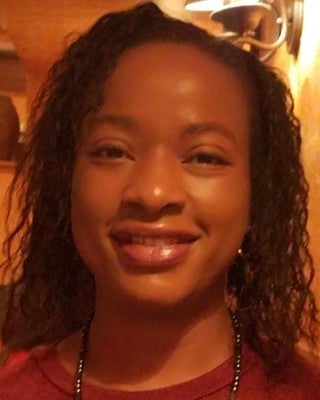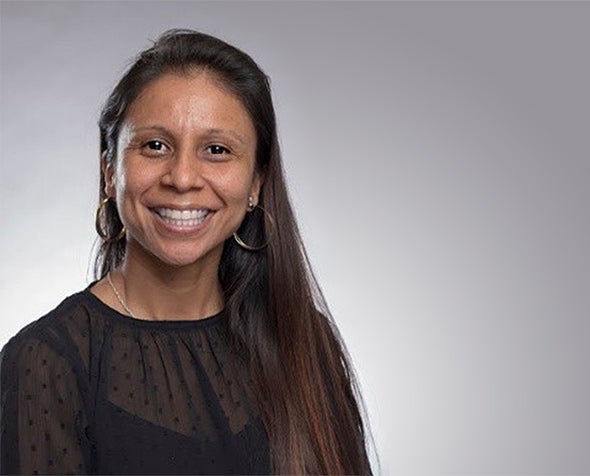Celebrating Black History Month with Afrah Caraballo
The University of Denver is committed to living our values of diversity and inclusion. We recognize that our community and institutional success is dependent on how well we engage and embrace the rich diversity of our faculty, staff, administrators, students and alumni. With that shared value in mind, throughout this academic year, we plan to publish a series of articles to celebrate cultural and ethnic heritage months. In partnership with Human Resources & Inclusive Community and the Staff of Color Association (SOCA), we will feature a staff or faculty member in recognition of each heritage month, along with an event to honor one another and learn about our unique differences.
Afrah Caraballo (MSW '06) was fresh off her service in the Air Force and searching for her next move when a counselor suggested social work.
“At the time I didn’t know what a social worker was,” Caraballo recalls. “When I found out I said, ‘Wow, that’s who I am.’ It’s a perfect fit: the advocacy, the heart, the sticking up for people — it’s the common thread across my life.”
She began searching for graduate programs and landed on the University of Denver’s Graduate School of Social Work (GSSW), where she would earn her degree and where she now serves as an adjunct faculty member. In addition, Caraballo works as a licensed clinical social worker, helping families and individuals heal from trauma through her growing nonprofit Family ROCS, which stands for reaching out, connecting and supporting.
Born and raised in Israel, Caraballo is a self-described extrovert and dancing queen who has always felt a call to help others.
In celebration of Black History Month, Caraballo joined the DU Newsroom for a discussion of her work, her experiences at DU and her greatest inspirations.
You love to teach classes that align with your personal purpose. How would you describe that that personal purpose?
To spread the message of love, hope and healing, post-traumatically, from anywhere in the world.
I was watching a program, and it talked about how to find your purpose. It says passion plus values equals purpose. My passion is to teach and educate and empower people, and my value is that every single person has a right to be healed and supported. I want everyone to know that they have that right. Even if they are not ready, they know that they have the right to healing.
Trauma doesn’t care who you are, so any human being has the potential to be traumatized. It’s about losing something important and that leaves a wound — that leaves a hole. You have the right and the ability to stop and give yourself permission to heal, and I truly believe everybody should know that.
A lot of the trauma your work addresses is cultural, racial and historic in nature. Could you share a bit about why this is central and important to the work you do?
When you are talking about cultural, racial and historical trauma, you may not necessarily be able to put your finger on the cause. Back when women couldn’t vote, major decisions were made without the input of half of the population. That left a mark. Back when people were property, decisions were made that currently affect descendants of slaves. And so, I feel if we are really going to heal trauma, we must get to the root of where it came from, even though it’s an old conversation. I just discovered a book called “Caste” by Elizabeth Wilkerson, and I’m like, “Yes! What she said.” When we just talk about racial equality or we hire one woman or we hire one Black person or one Asian person, we are treating leaves. We are treating symptoms. We are not getting to the root of how this happened so we can change systemically.
When people come to you in the hopes of moving toward healing, where do you start?
Educate first. No one wants to feel like a victim. When you say let me heal you, let me rescue you — no one wants to be rescued. So, education first, advocacy, and then let’s talk about treatment. When you’re moving from an education perspective, it opens the door to so many healing options. As you are educating someone, you are empowering, and just that changes the chemistry.
Tell us about your experience of being a student on campus (2004-06), particularly a student of color at a predominantly white institution?
There were some real lonely moments. I think I was the only Black person in my class. The program was an amazing and rich program, but as far as looking around and seeing anyone like me, I didn’t. Part of that is because I was a single mom. I would drive up, go to class and have to pick my kids up from day care. I was one of the oldest people in the class as well, and I was a veteran of the Air Force.
Now that you’re helping shape the way students show up as social workers, what are you trying to impart to them?
That trauma is an equal opportunity offender. That any human being can be traumatized. It is important to humanize the person in front of you regardless of the body they are in. We talk a lot about culture and trauma. I always pause and say, “When I say culture, I don’t mean race.” I’m always careful to make the distinction between race and culture, because there are multiple cultures within one race. Humanize each person regardless of what you see. What I try to bring to my classes is intentional, conscious awareness. Slow down and humanize.
Who in your life has inspired you to be the person you are and do the work you do?
Harriet Tubman. Even before I had kids, in Israel my parents showed me the movie “A Woman Called Moses,” and I was like, “I’m going to run away.” And at 14 I did. That’s where I got my rebellious streak. No matter how bad it is, freedom is available to you. That comes back to my purpose and my commitment to healing people from trauma.
My kids. They have grown me up. You are forever changed once you have kids, on a chemical level. My kids gave me direction and are the ones who snapped me into consciousness. Before them I was a candle in the wind.
My dad and my mom and the courage it took for them to just pick up their life in 1969 and say I’m going to move to a country where I don’t know the language and I don’t know the people, because I want my kids to grow up safe and free — and that wasn’t happening in the ‘60s here. It took me a long time to appreciate what they did and why they did it, but that totally set me up to have this bigger worldview.
Oprah Winfrey. At least two or three times a week I say, “If Oprah can do it, so can I.” She is a huge inspiration for me. Oprah gave herself permission to be more when everything else said no.
In partnership with Human Resources & Inclusive Community, the Office of Diversity, Equity, and Inclusion, The Cultural Center, Community + Values, and the Staff of Color Association, we will feature a staff or faculty member in recognition of each heritage month, along with an event to honor one another and learn about our unique differences. If you are aware of any events that are happening on campus or have an idea for Heritage Month events, we'd love to hear about them and promote them campus-wide.









